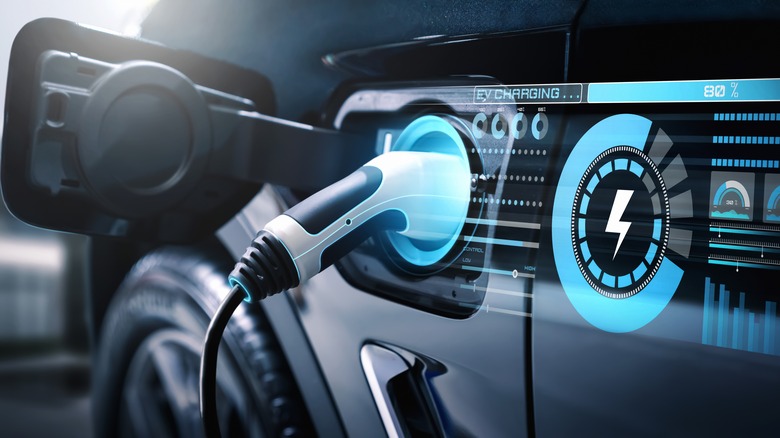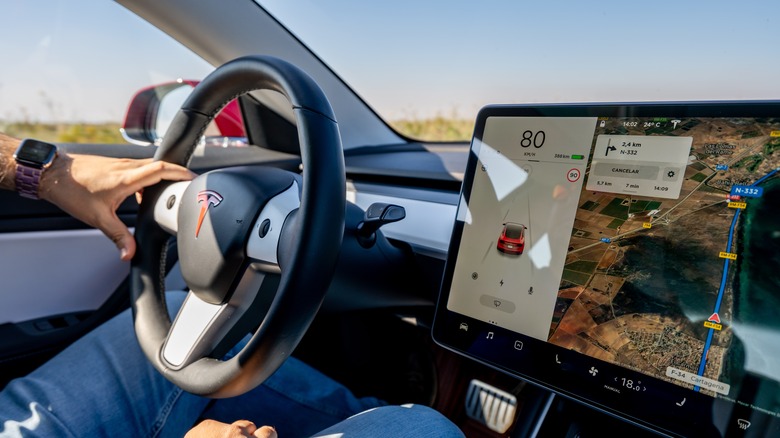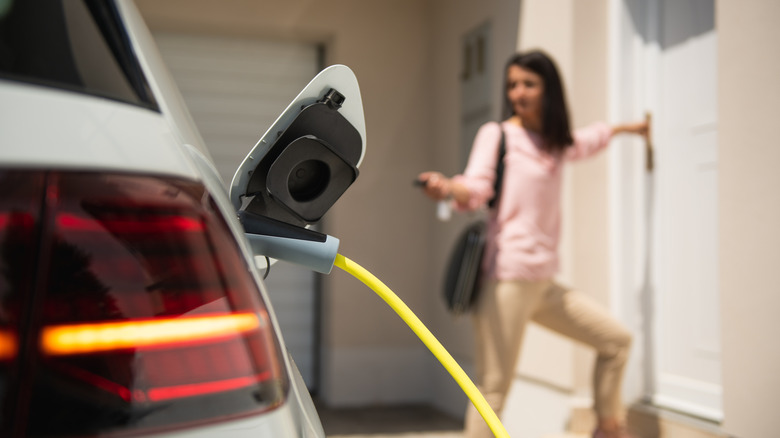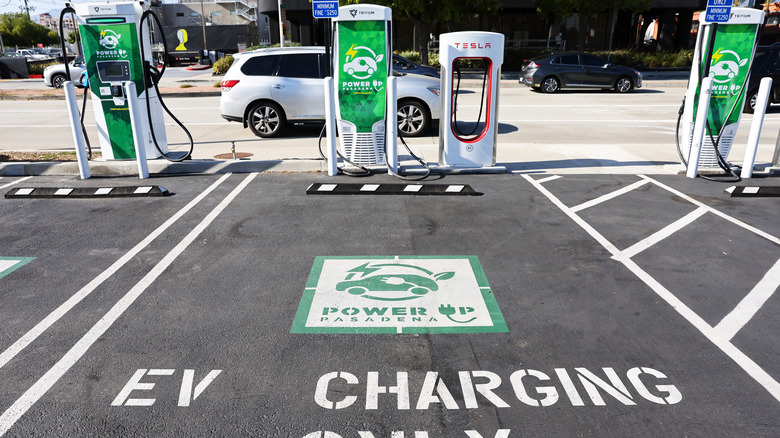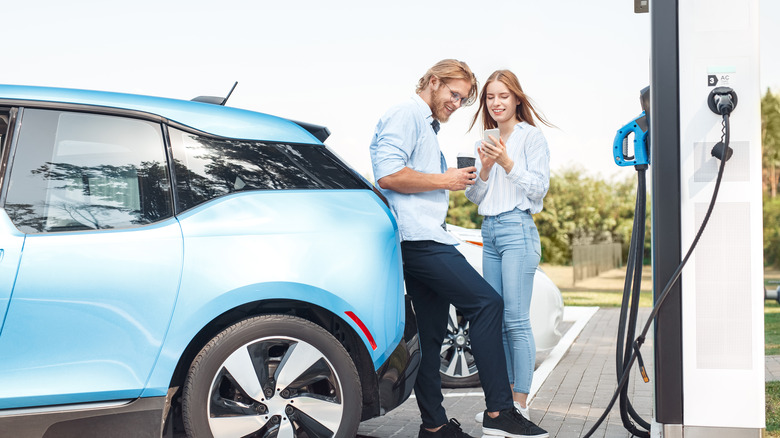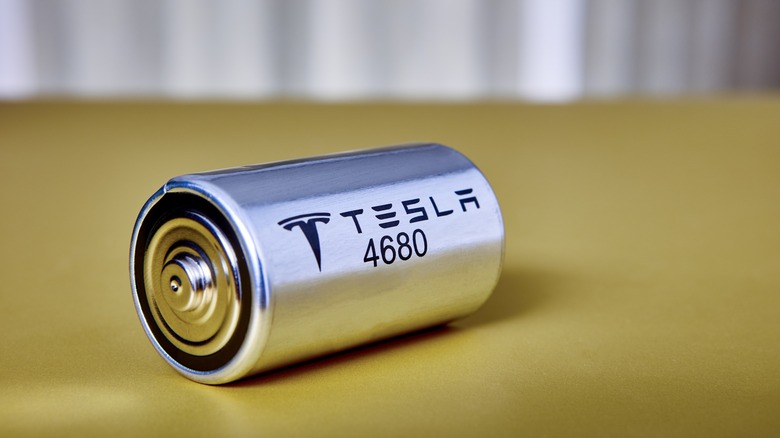5 Rules You Should Follow To Make Your Electric Vehicle Battery Last Longer
If you want never want to spend another penny on gasoline and decrease your carbon footprint, an electric vehicle could sound like a heavenly option. These EVs run on rechargeable lithium-ion batteries that you can plug into a power source either at home or a public charging station whenever you need to replenish their power.
However, it's not all plug-and-go when it comes to EV batteries. Unless you are fast charging (which gives you 100 to 200 miles of range in about 30 minutes), according to the Department of Energy, juicing up takes a while to power a trip. If you want your battery to go the distance, charging time is not the only factor to look at. The way you drive and your battery care habits are just as important in determining how long your battery can last. Here are a few well-known tricks to make your electric battery last longer.
Extreme temperatures affect EV batteries
Whether it's hot or cold, extreme weather conditions can affect EV charging times. The batteries are temperature-sensitive, and if temperatures are too hot or too cold, chances are the range, charge rate, and battery lifespan will be affected.
Cold weather impacts battery chemistry and range of a battery. The combination of low temperatures and turning on the heat in a car can reduce a batter's energy. Tests conducted by AAA show that when the temperature drops to 20℉ the range decreases by 12%. But, once a heater is on that percentage accelerates to 41%.
Similarly, heat is just as bad for batteries. Although warmer temperatures can improve battery efficiency, excessive heat will degrade its lifespan. The AAA report goes on to say that once the temperature reaches 95°F, it results in a slight decrease of 4% in the driving range.
How you drive your car matters
The way you drive your car matters if you want to get maximum battery life. That's why EV drivers should consider life in the slow lane to get the most out of their driving experience. However, this could be a little challenging as EVs are known to accelerate and generate more torque than their gas-guzzling counterparts. This design makes it easy to floor the accelerator. They are generally known to be high-performing vehicles when it comes to speed — even the ones that are not designed as sports cars. For example, there are EVS out there like the Tesla Model S Plaid can go from 0 to 60 mph in 2.07 seconds.
While it may be thrilling for drivers that enjoy break-neck speeds, going too fast can significantly diminish battery power — especially if they are being driven in colder climates (via Wired).
Avoid fast charging
Fast charging is a convenient and speedy way to top up your EV battery, but may cause it to deteriorate faster as a result, according to findings by scientists from the University of California, Riverside. They published a study that showed how fast charging stations eventually cause car batteries to "crack, leak and lose their storage capacities."
In the report, the researchers conducted a series of tests on EV batteries, which showed that after 13 regular charging cycles, battery storage capacity remained almost the same. But, after fast charging, the capacity dropped much more quickly. The researchers noted that after 40 charging cycles, batteries only had 60% of their storage capacity left.
If you want to prolong the life of your battery for as long as possible slow charging may be the way to go. This can fit in two categories: Level 1 or Level 2 charging. Level 1 is the cheapest but also takes the longest time to charge — 40 to 50 hours from empty to full charge. Level 2 charging can be found in residences and public charging stations. It can fully charge a battery within 4 to 10 hours (via U.S. Department of Transportation).
Avoid fully charging your EV
It may sound counterintuitive, but if you want your EV battery to have a longer life, you should avoid charging your electric vehicle to 100% when charging it. That's because regularly charging and discharging lithium-ion batteries cause them to degrade and lose power over time. These "charge cycles" as they are called are a huge reason why EV batteries have short lives and can no longer be used once they reach around 70% to 80% of their capacity (via Science Direct). To combat this issue, most EVs come with built-in battery management and monitoring systems that stop batteries from being drained to zero and charging up to 100%.
Charging an EV battery all the way also is damaging because of the heat generated while charging. According to Recurrent, high temperatures can harm EV batteries and cause "physical stress and damage," which ultimately lowers their capacity. So, how much should you charge your battery? It's recommended to keep your battery at 20% to 80% if you want to prolong its lifespan.
Make sure your EV battery is stored correctly
If you plan on stowing your EV for any period because you're going on vacation or for any other personal reason, you need to make sure it is being stored in the right conditions to maintain optimum battery health.
Manufacturers differ about methods used to store EV batteries so that they would not be degraded. Some manufacturers like Ford say that you shouldn't charge your vehicle to 100% or leave it plugged in when storing it. Instead, the company recommends users partially charge it to 50% and leave it unplugged in storage. Tesla on the other hand that their cars should always be kept plugged in to prolong battery life.
The place where you store your batteries makes a difference as well. MotorTrend reports that to keep batteries healthy, they should be kept in a dry place away from moisture. And because batteries are affected by very hot or cold temperatures, it may be a good idea to keep your EV inside — in a climate-controlled garage if possible.
